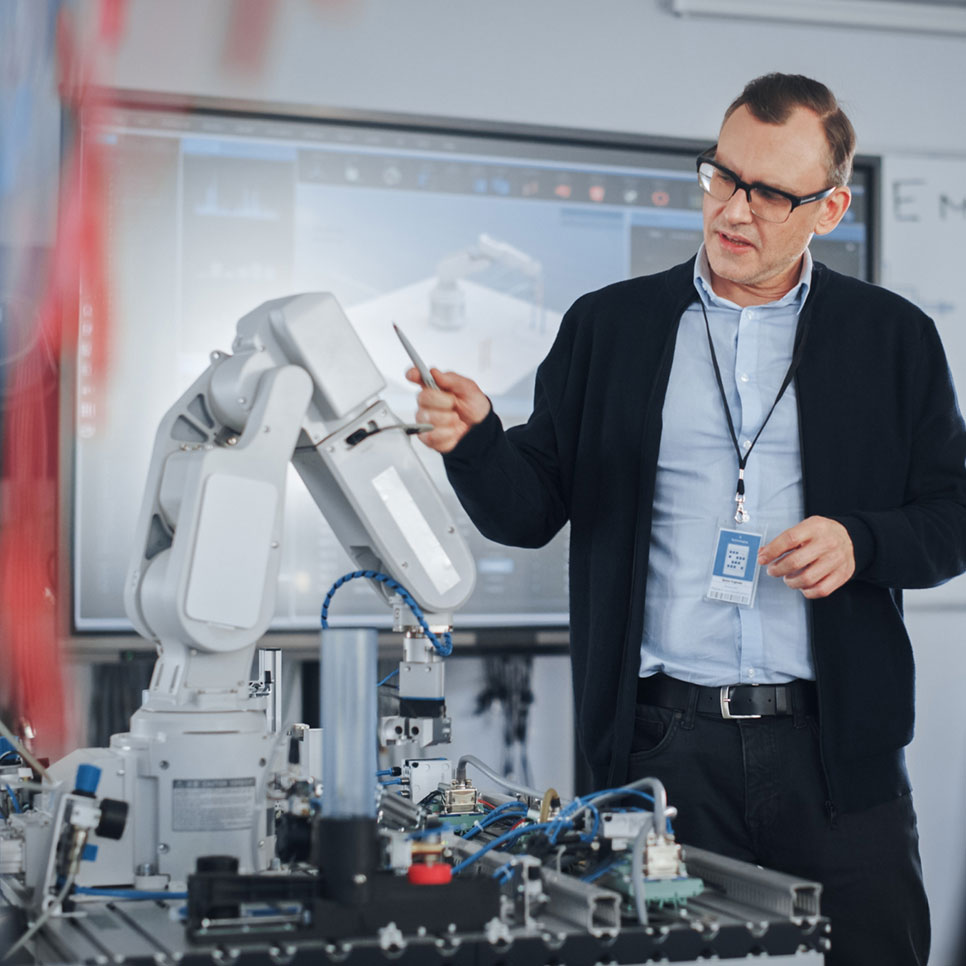RPA Service Provider
BLOG
More and more companies are moving towards automation with increased demand to stay relevant and customer focus. Robotic Process Automation (RPA) is an innovative modern technology that makes it easy to build, deploy, and manage software robots. RPA is transforming industries by emulating repetitive tasks and minimizing human errors.
In 2023, the global RPA service market was valued at $13.86 billion. It is estimated to grow by 17.1% CAGR that $18.18 billion in 2025 to $64.47 billion by 2032. The US RPA market is also projected to grow exponentially with estimate value to $22.32 billion by 2032. This will be mostly driven by growth of IoT and automation improvements in different industries.
The United States, known for its strong technological innovation, is home to many leading RPA service providers that are helping businesses streamline their processes, cut costs, and improve accuracy.
In this article we will take a closer look at the top 12 RPA companies in the USA for 2025, evaluating their industry expertise, unique features, strengths, and potential drawbacks. Each of these companies brings unique value to the table. Ranging from large-scale automation platforms to specialized solutions for specific industries we have ensured you get the right automation partner for your needs.
Top 12 RPA Providers in the USA in 2025
| Company Name | Features | Revenue (2023) | Pros | Cons |
|---|---|---|---|---|
| UiPath | Drag-and-drop functionality, AI and ML capabilities, Multi-platform integration | $1.6 billion | User-friendly, Extensive workflow library, Strong community support | High costs for smaller businesses, Complexity in scaling |
| Accelirate | AI and ML integration, Business outcomes focus, Robust customer support | Private | Highly specialized, Excellent customization, Cost-effective for mid-sized businesses | Limited global presence |
| Automation Anywhere | Cloud-native, AI-powered bots, Powerful analytics tools | $500 million | Strong AI capabilities, Scalable, Pre-built solutions | Steeper learning curve |
| SS&C Blue Prism | Enterprise-level security, Scalable, Cloud and on-premises options | $1.5 billion+ | Strong focus on security, Easy integration, Scalable | More expensive than smaller vendors |
| Microsoft Power Automate | Cloud-based automation, Seamless Microsoft integration, Low-code/no-code | N/A | Seamless Microsoft integration, Affordable, Easy for non-developers | Limited capabilities vs specialized RPA vendors |
| Appian | Low-code platform, Unified process automation, Case management | $500 million+ | Combines workflow and case management, Highly customizable, Low-code | Expensive for small businesses |
| AutomationEdge | Hyperautomation platform, AI and ML integrations, IT process automation | N/A | Strong focus on IT automation, Fast deployment, AI-enhanced | Primarily focused on IT sectors |
| EdgeVerve | AI-powered automation, Customizable workflows, Strong analytics tools | Private | Backed by Infosys expertise, Robust AI and ML integration, Focused on finance | Higher costs for small businesses |
| NICE | AI-powered customer experience automation, Contact center optimization, Process analytics | $1.9 billion | Specialization in customer experience, Strong AI and analytics, Customization | Less suited for non-customer service industries |
| Fortra | Cybersecurity-focused automation, Cloud and on-premises options, AI and ML-powered | $350 million+ | Excellent security capabilities, Flexible deployment, Comprehensive automation | Limited to security-heavy industries |
| Intellias | Custom RPA development, AI and ML-powered automation, Software engineering expertise | $200 million+ | End-to-end transformation expertise, Highly scalable, Personalized strategies | Pricing high for small to mid-sized companies |
| Pega | AI-driven automation, Unified platform combining RPA, BPM, and CRM | $1.2 billion | Industry-leading AI and customer engagement tools, Strong integration | Steep learning curve, High implementation costs |
| WorkFusion | AI-powered automation for compliance-heavy industries, Pre-trained AI bots, Cloud-native | $200 million+ | Focus on compliance, AI-driven automation, Customizable bots | Limited to compliance-heavy industries |
| Nintex | Workflow automation, Drag-and-drop process mapping, Integration with enterprise systems | $250 million+ | User-friendly, Wide range of integrations, Cost-effective | Focus on workflow automation over advanced RPA |
Let’s look at each of them in detail for a better understanding that can help you select the right RPA service provider.
1. UiPath
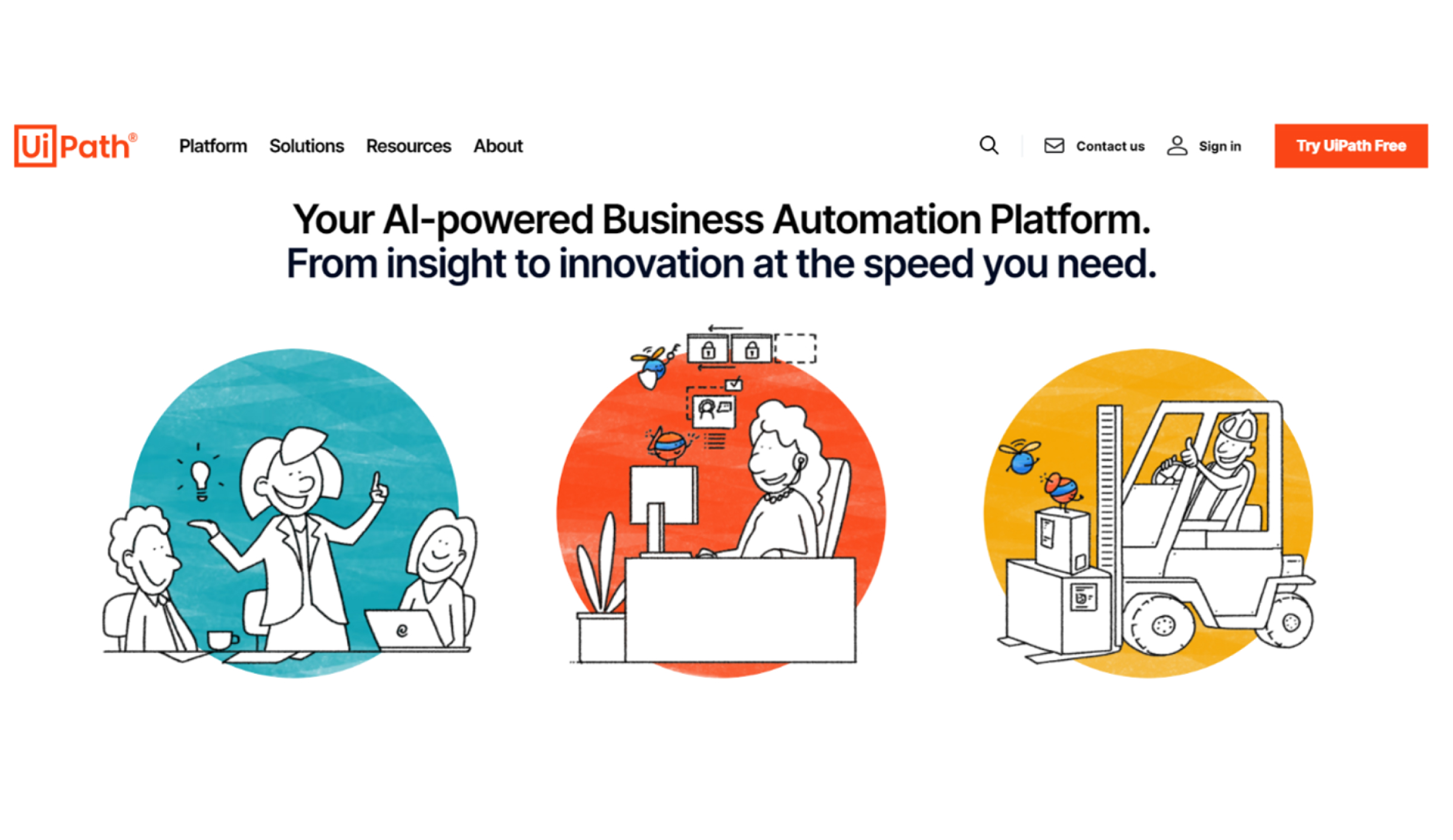
Founded: 2005
Overview: UiPath is a leading name in the RPA industry, offering a comprehensive suite of automation tools designed for various industries. Their user-friendly platform empowers businesses to build and deploy automation rapidly.
Key Features:
- Drag-and-drop functionality for ease of use
- AI and machine learning capabilities for advanced automation
- Multi-platform integration
Pros:
- Drag-and-drop functionality for ease of use
- AI and machine learning capabilities for advanced automation
- Multi-platform integration
Cons:
- High costs for smaller businesses
- Complexity in scaling large deployments
Industry Expertise: Finance, healthcare, manufacturing, retail, government
Pricing: Custom pricing based on company needs
Revenue: $1.6 billion (2023)
2. Accelirate
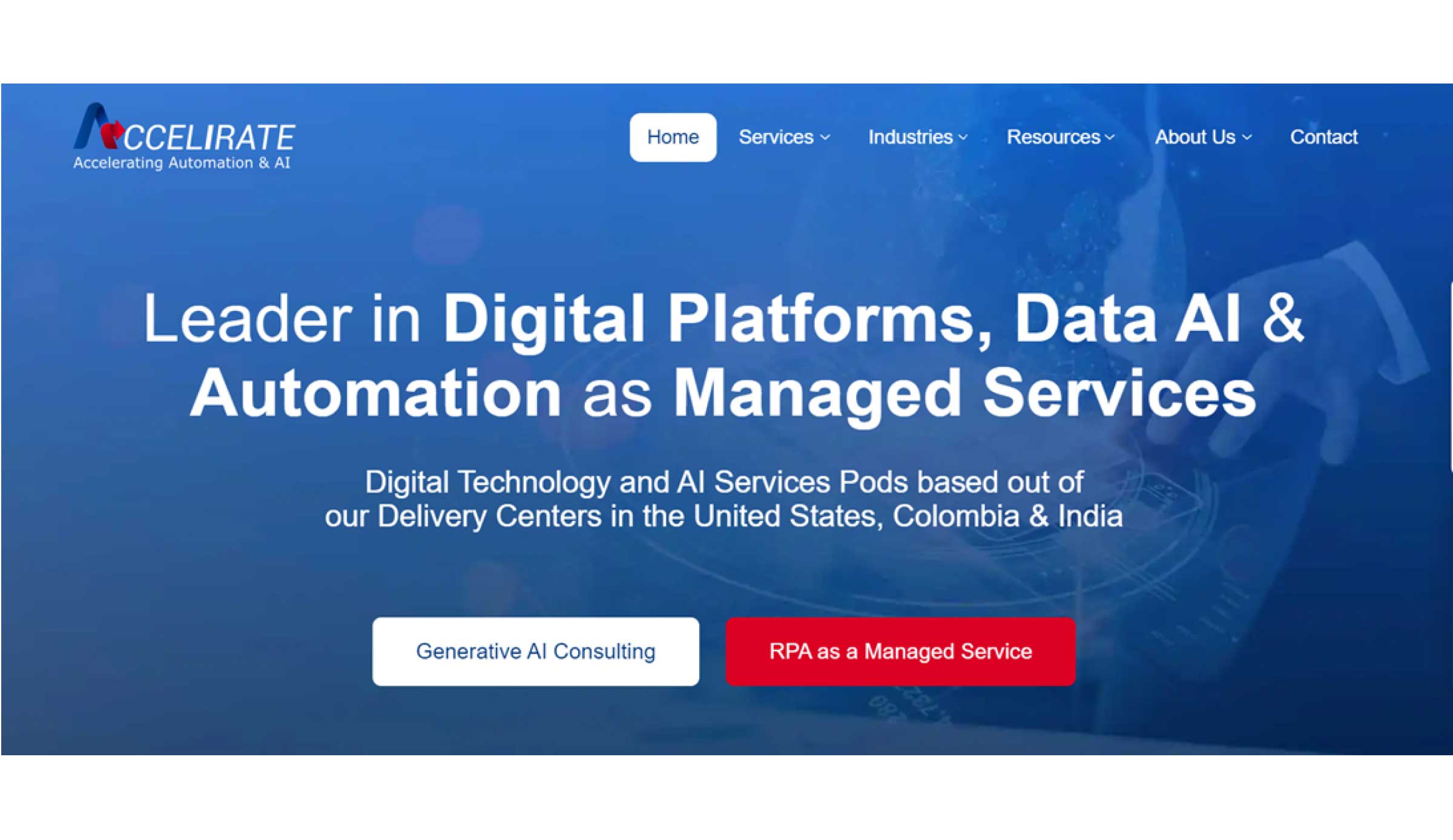
Founded: 2016
Overview: Accelirate stands out as an RPA service provider specializing in business process automation and AI integration. With a strong focus on helping enterprises achieve their automation goals, Accelirate offers end-to-end RPA services, from strategy to implementation. Accelirate also holds one of the top spots in the industry as a dedicated UiPath platinum partner.
Key Features:
- Expertise in AI and ML integration
- Focus on business outcomes and ROI
- Robust customer support
Pros:
- Excellent customization capabilities
- Highly specialized in Robotic Process Automation and intelligent automation
- Cost-effective for mid-sized businesses
Industry Expertise: Banking, healthcare, insurance
Pricing: Custom pricing
Revenue: Private
Looking for seamless automation and workflow optimization?
Talk to Our Experts Today!3. Automation Anywhere
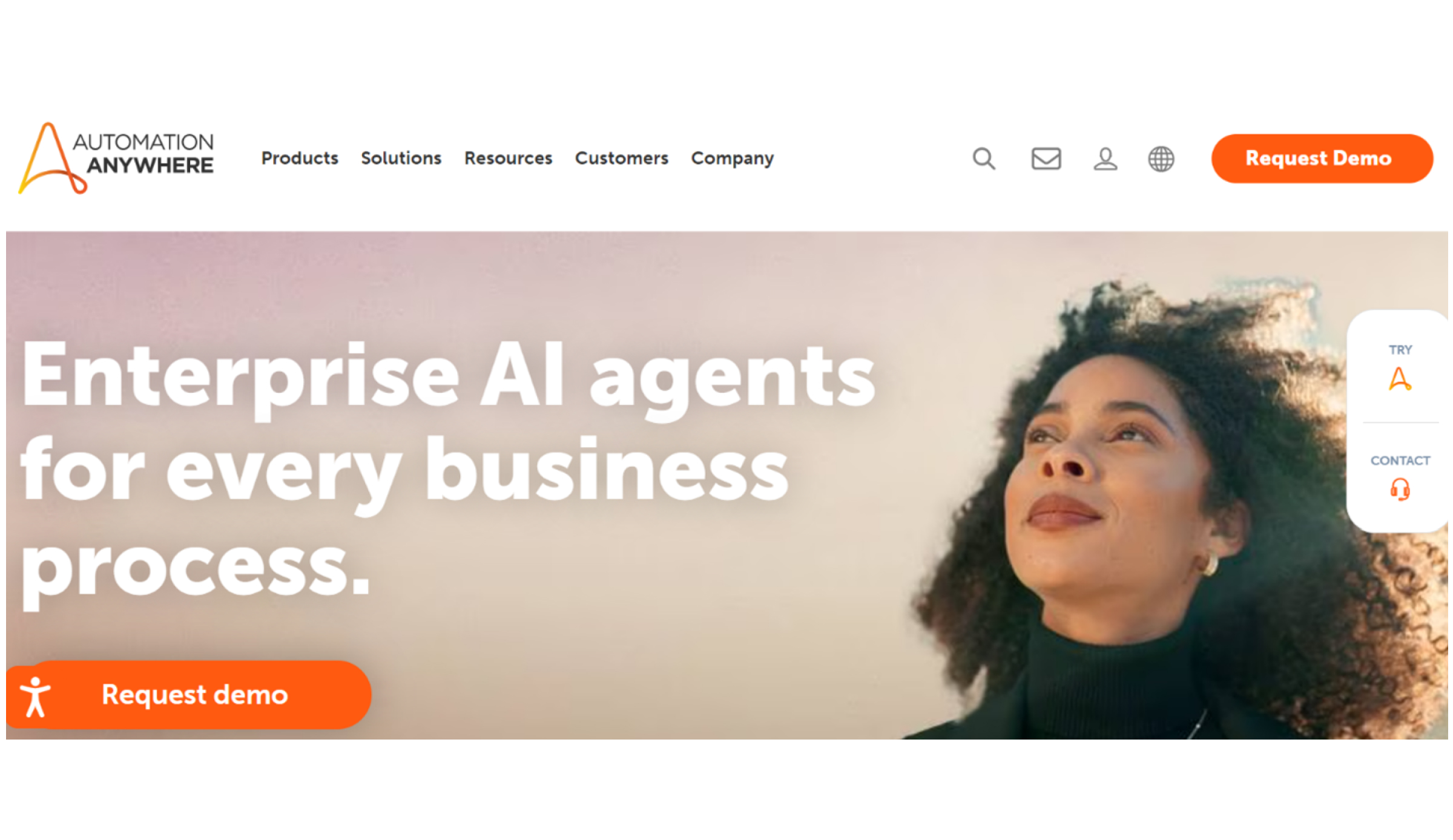
Founded: 2003
Overview: A pioneer in the RPA industry, Automation Anywhere has developed a cloud-native, AI-powered platform designed to deliver end-to-end automation solutions.
Key Features:
- Cloud-native platform
- AI-powered bots for enhanced capabilities
- Easy-to-use interface with powerful analytics tools
Pros:
- Strong AI capabilities
- Scalable for large enterprises
- Excellent bot store for pre-built solutions
Cons:
- Steeper learning curve compared to other platforms
Industry Expertise: Finance, BPO, retail, manufacturing
Pricing: Based on subscription models
Revenue: $500 million (2023)
4. SS&C Blue Prism
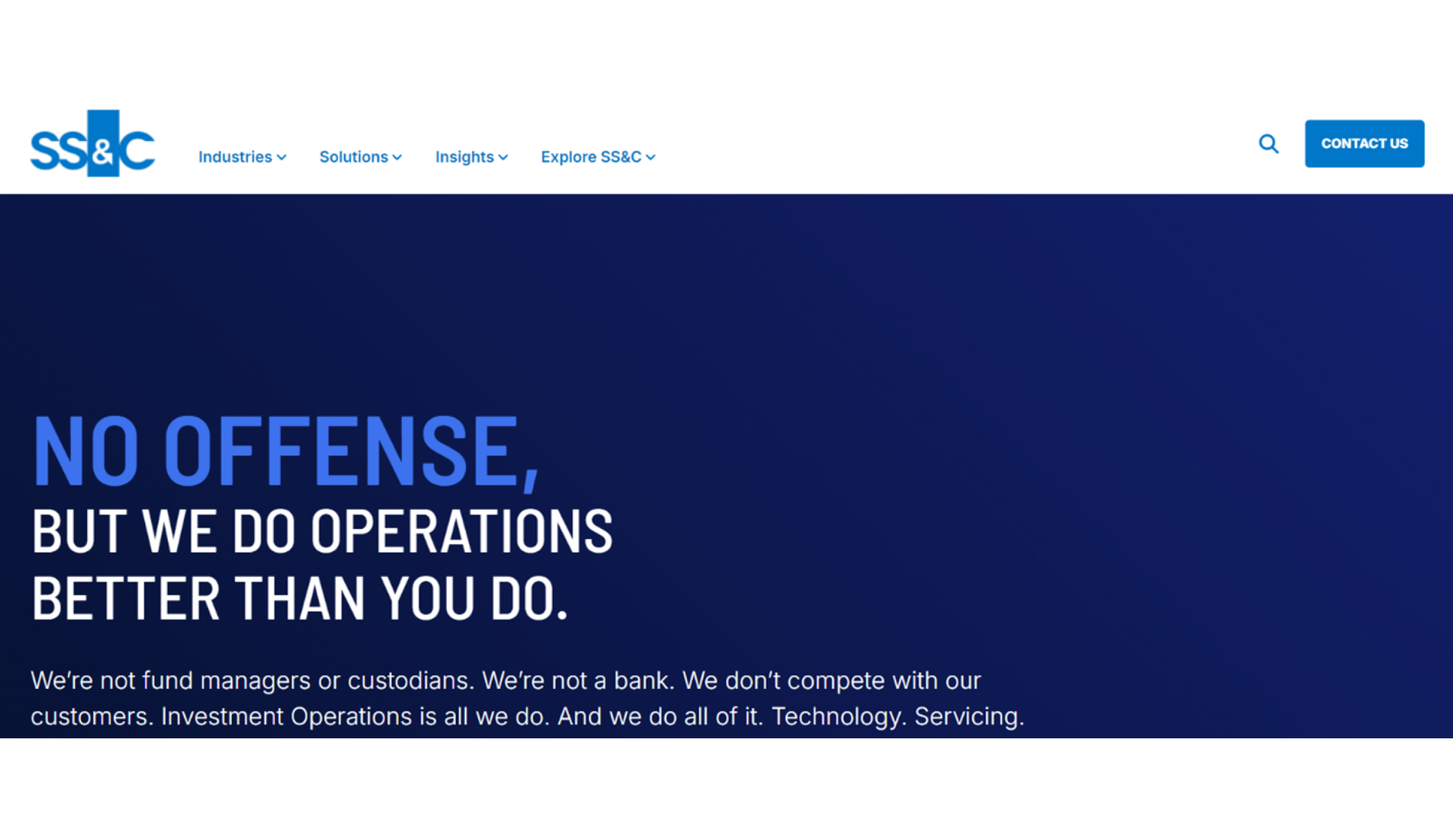
Founded: 2001
Overview: Blue Prism, now part of SS&C Technologies, is an RPA industry leader with a focus on scalable enterprise automation. The platform is ideal for businesses seeking secure, reliable, and scalable solutions.
Key Features:
- High level of security and compliance
- Scalable capabilities for large enterprises
- Cloud and on-premises options
Pros:
- Strong focus on enterprise-level security
- Easy integration with existing IT systems
- Scalable for multinational operations
Cons:
- Relatively expensive than other RPA vendors
Industry Expertise: Banking, Healthcare, Life sciences, Insurance
Pricing: Enterprise pricing models
Revenue: $1.5 billion+
5. Microsoft Power Automate
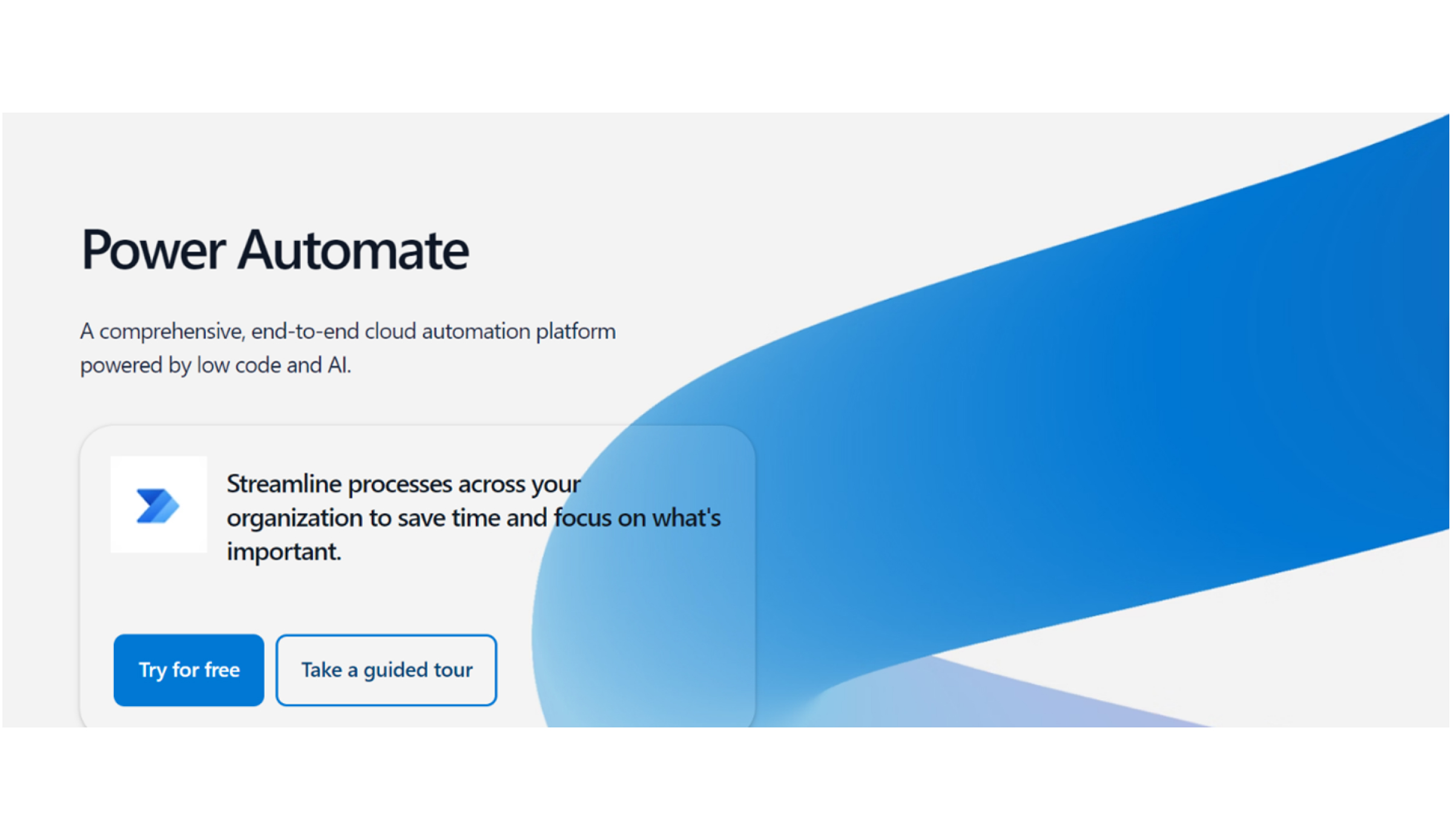
Founded: N/A (Product launched in 2019)
Overview: Microsoft Power Automate is a cloud-based RPA platform that integrates seamlessly with Microsoft products like Dynamics 365 and Azure, making it a powerful tool for businesses already within the Microsoft ecosystem.
Key Features:
- Cloud-based automation
- Integration with Microsoft 365 and Azure
- Low-code/no-code interface
Pros:
- Seamless integration with Microsoft products
- Affordable for small to medium businesses
- Easy to learn for non-developers
Cons:
- Limited capabilities compared to specialized RPA vendors
Industry Expertise: General, government, finance
Pricing: Subscription-based pricing
Revenue: N/A
6. Appian
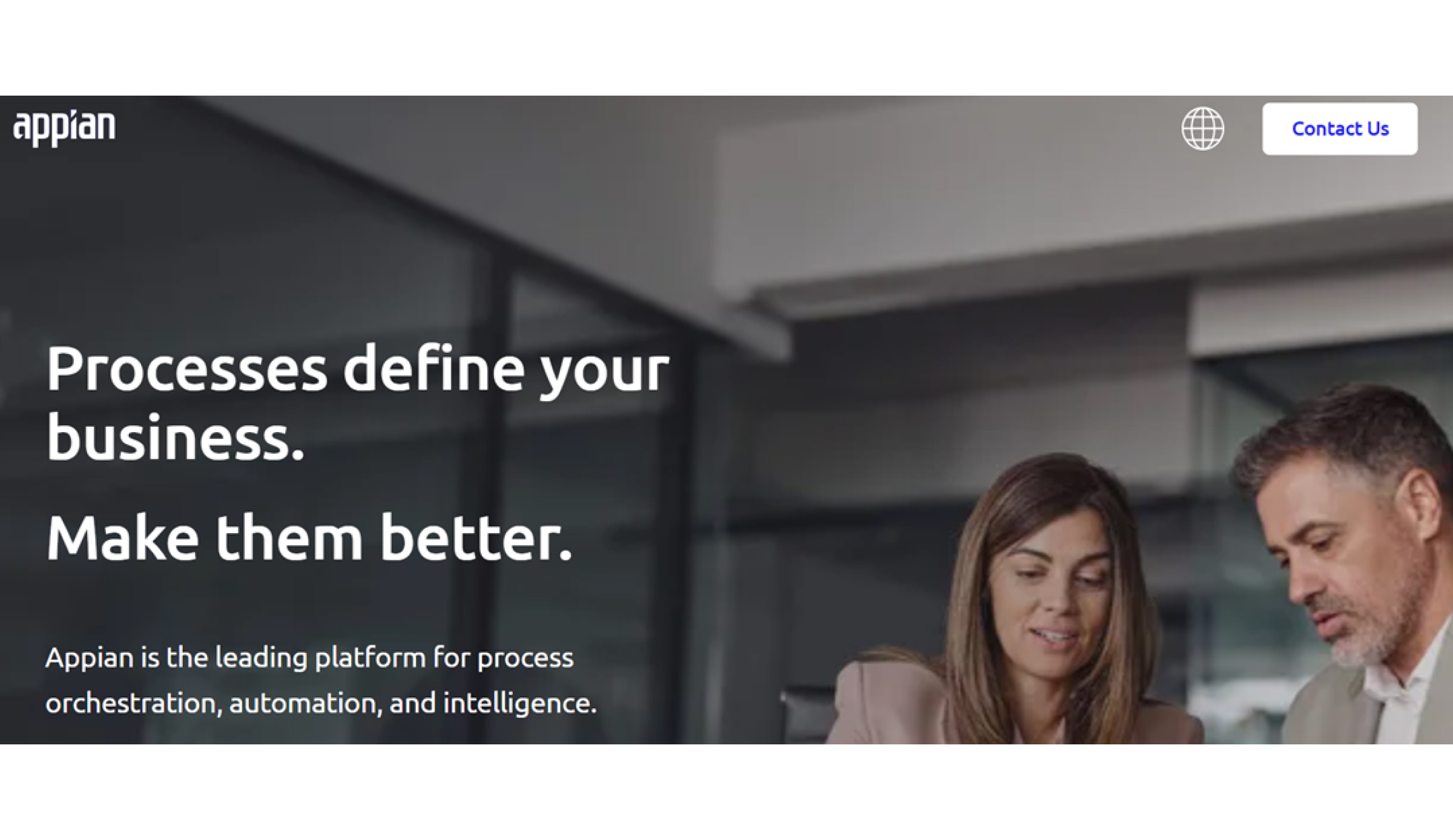
Founded: 1999
Overview: Appian focuses on low-code development and automation, offering a unified platform for process automation, workflow optimization, and case management. The platform is ideal for businesses looking for holistic process improvements.
Key Features:
- Low-code development platform
- Unified process automation
- Case management
Pros:
- Combines workflow automation and case management
- Highly customizable
- Low-code platform for faster development
Cons:
- Pricing can be expensive for small businesses
Industry Expertise: Finance, healthcare, government
Pricing: Custom pricing based on user licenses
Revenue: $500 million+
7. Automation Edge
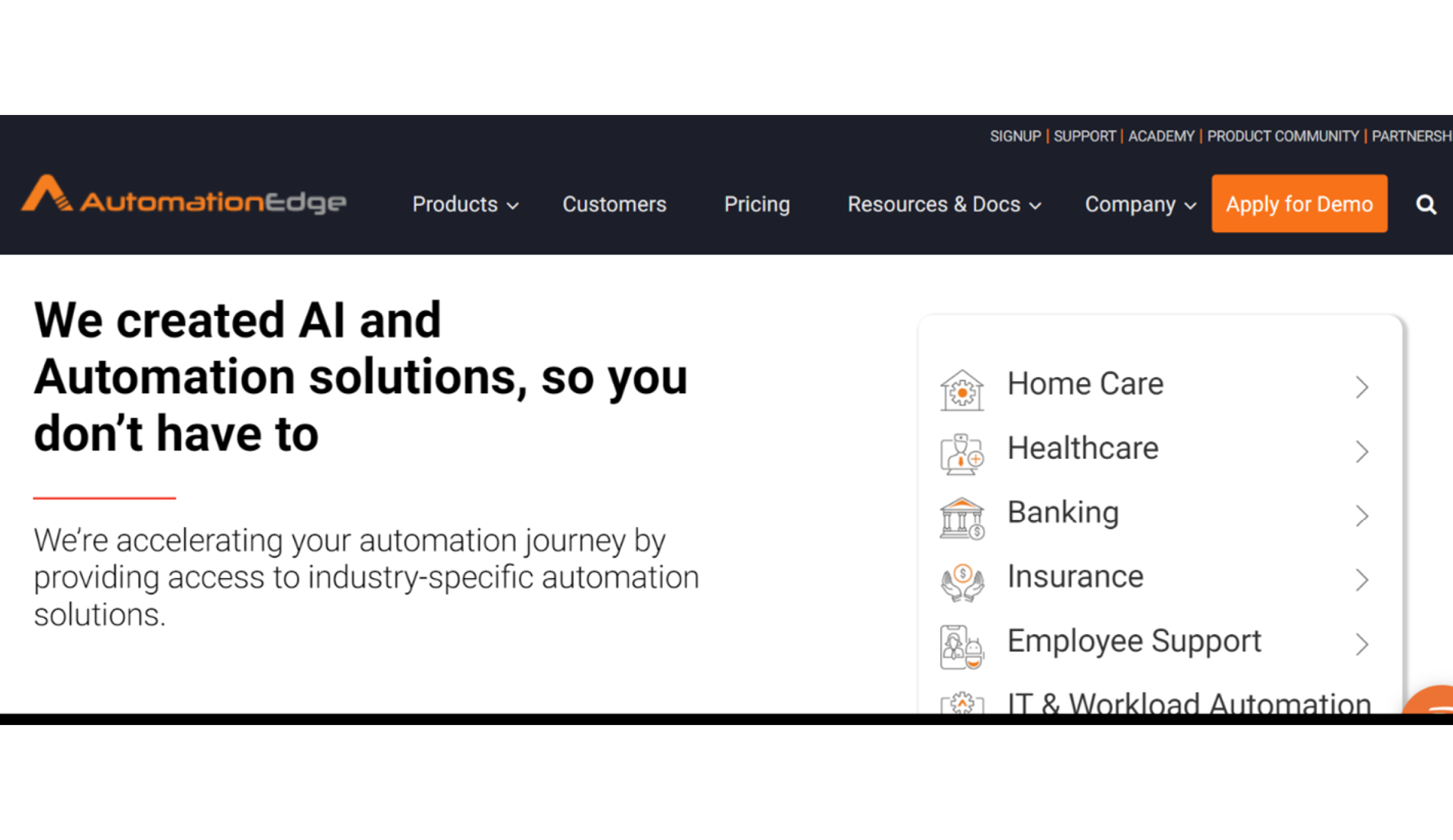
Founded: 2015
Overview: Automation Edge offers hyperautomation solutions, combining RPA with artificial intelligence and machine learning. This platform specializes in IT process automation and service desk automation.
Key Features:
- Hyperautomation platform
- AI and ML integrations
- IT process automation
Pros:
- Strong focus on IT and service desk automation
- Fast deployment times
- AI-enhanced automation capabilities
Cons:
- Primarily focused on IT sectors
Industry Expertise: IT services, telecommunications, healthcare
Pricing: Subscription-based
Revenue: N/A
8. EdgeVerve
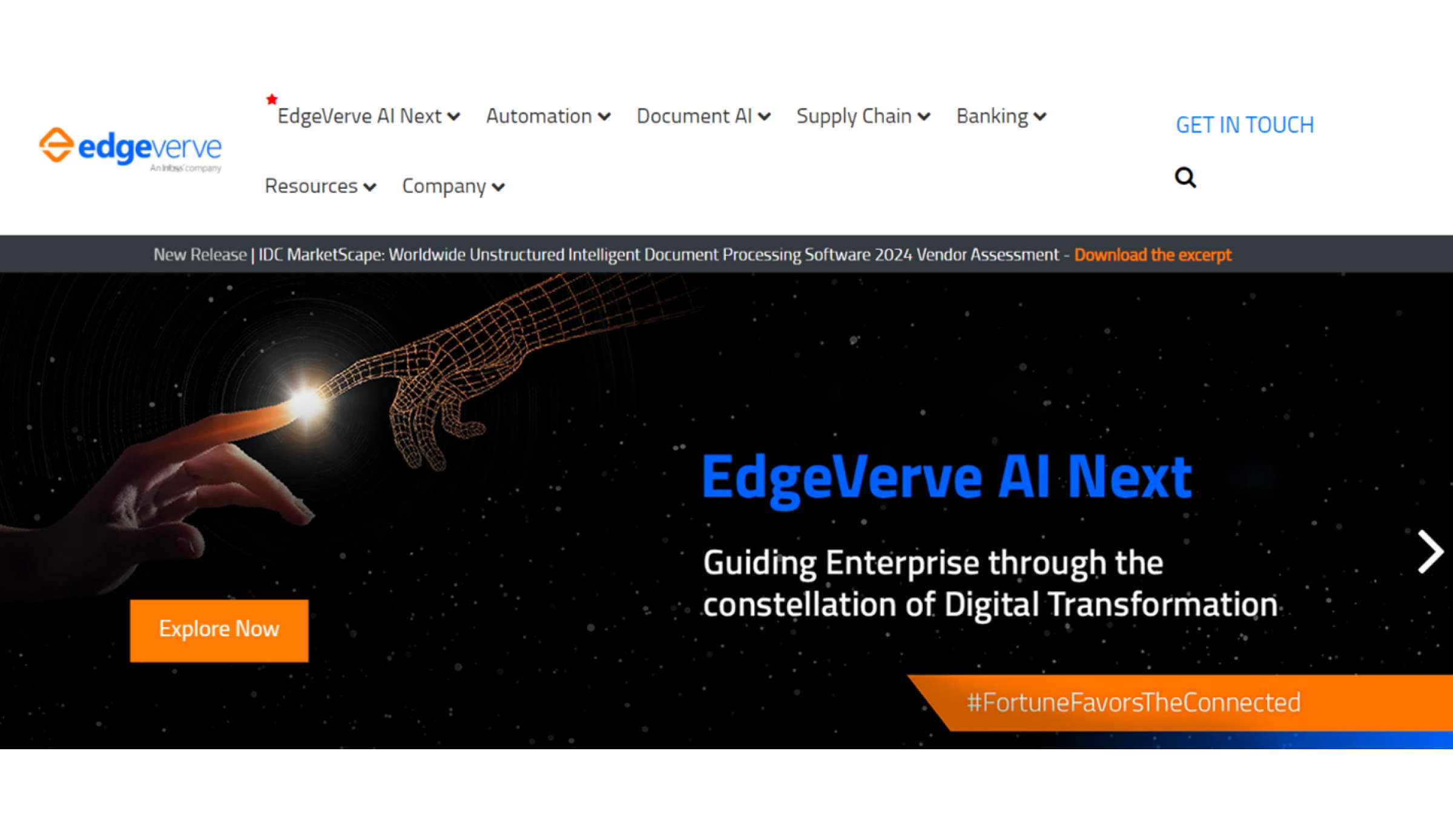
Founded: 2014
Overview: As a subsidiary of Infosys, EdgeVerve offers cutting-edge automation solutions that cater to various industries, with a particular focus on finance and banking.
Key Features:
- AI-powered automation
- Customizable workflows
- Strong analytics tools
Pros:
- Backed by Infosys expertise
- Robust AI and ML integration
- Focused on finance and banking
Cons:
- Higher costs for small businesses
Industry Expertise: Banking, finance, retail
Pricing: Custom pricing
Revenue: Private
Got questions?
Let’s Discuss!9. NICE
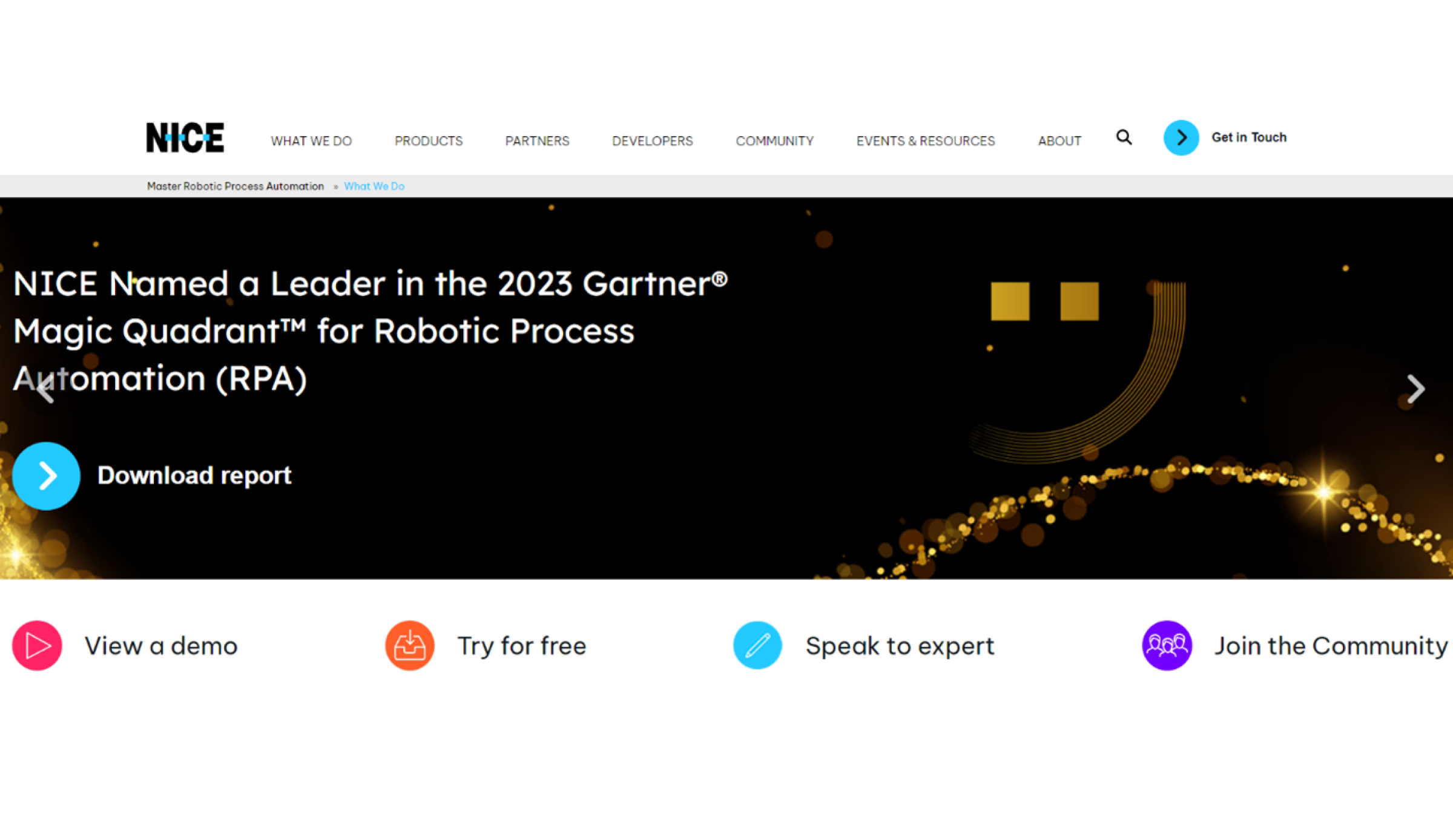
Founded: 1986
Overview: NICE focuses on customer experience management and offers RPA tools that improve operational efficiency, particularly in contact centers.
Key Features:
- AI-powered customer experience automation
- Contact center optimization
- Process analytics
Pros:
- Specialization in customer experience
- Strong AI and process analytics features
- High levels of customization
Cons:
- Less suited for non-customer service industries
Industry Expertise: Customer service, finance, retail
Pricing: Subscription-based pricing
Revenue: $1.9 billion (2023)
10. Fortra (Formerly HelpSystems)
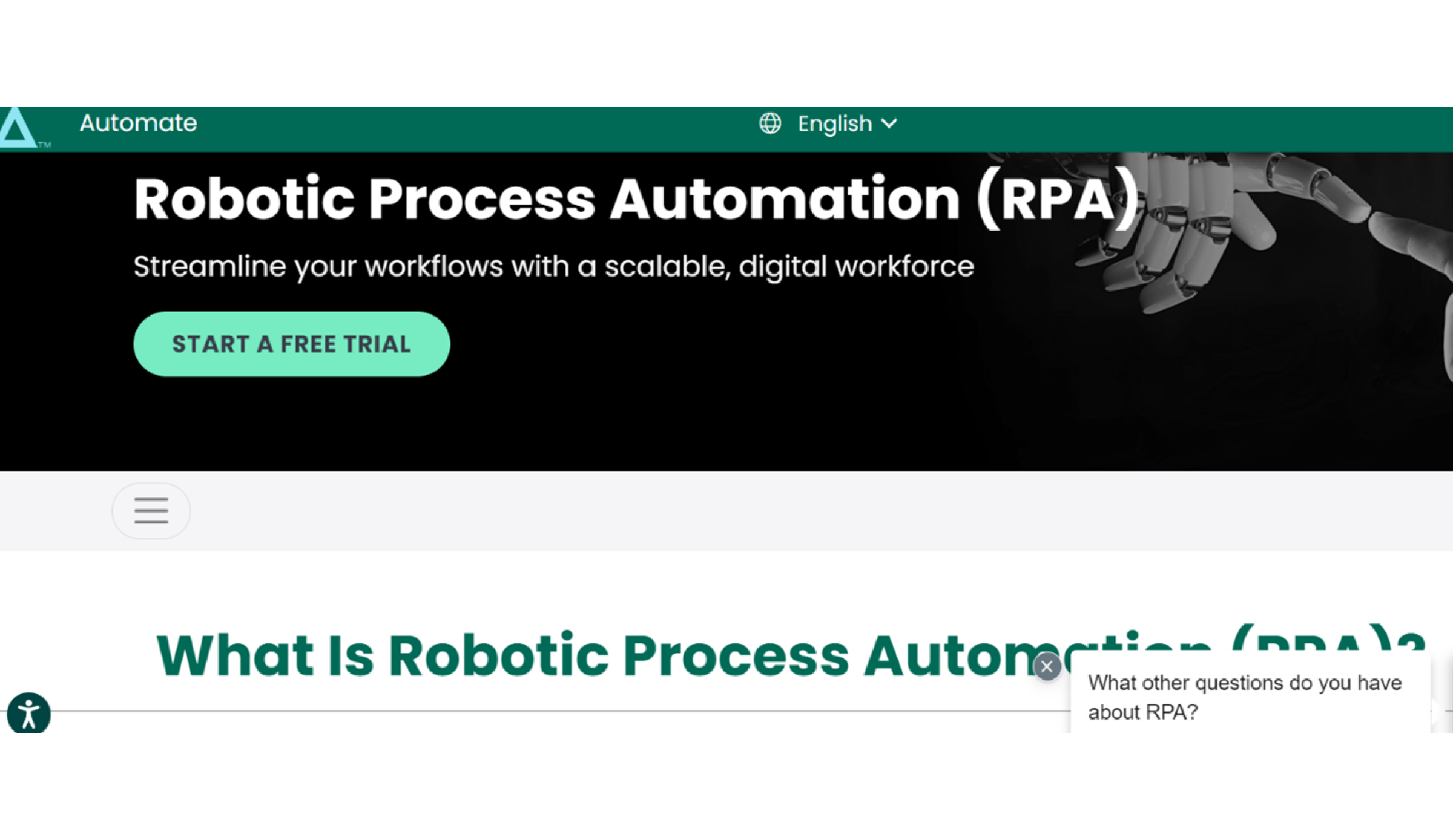
Founded: 1982
Overview: Fortra is an RPA and cybersecurity solution provider that helps businesses automate their processes securely. They focus on both RPA and security automation, making it an excellent choice for enterprises with stringent security needs.
Key Features:
- Cybersecurity-focused automation
- Cloud and on-premises options
- AI and ML-powered automation
Pros:
- Excellent security capabilities
- Flexible deployment options
- Comprehensive automation features
Cons:
- Limited to security-heavy industries
Industry Expertise: Healthcare, finance, insurance
Pricing: Custom pricing
Revenue: $350 million+
11. Intellias
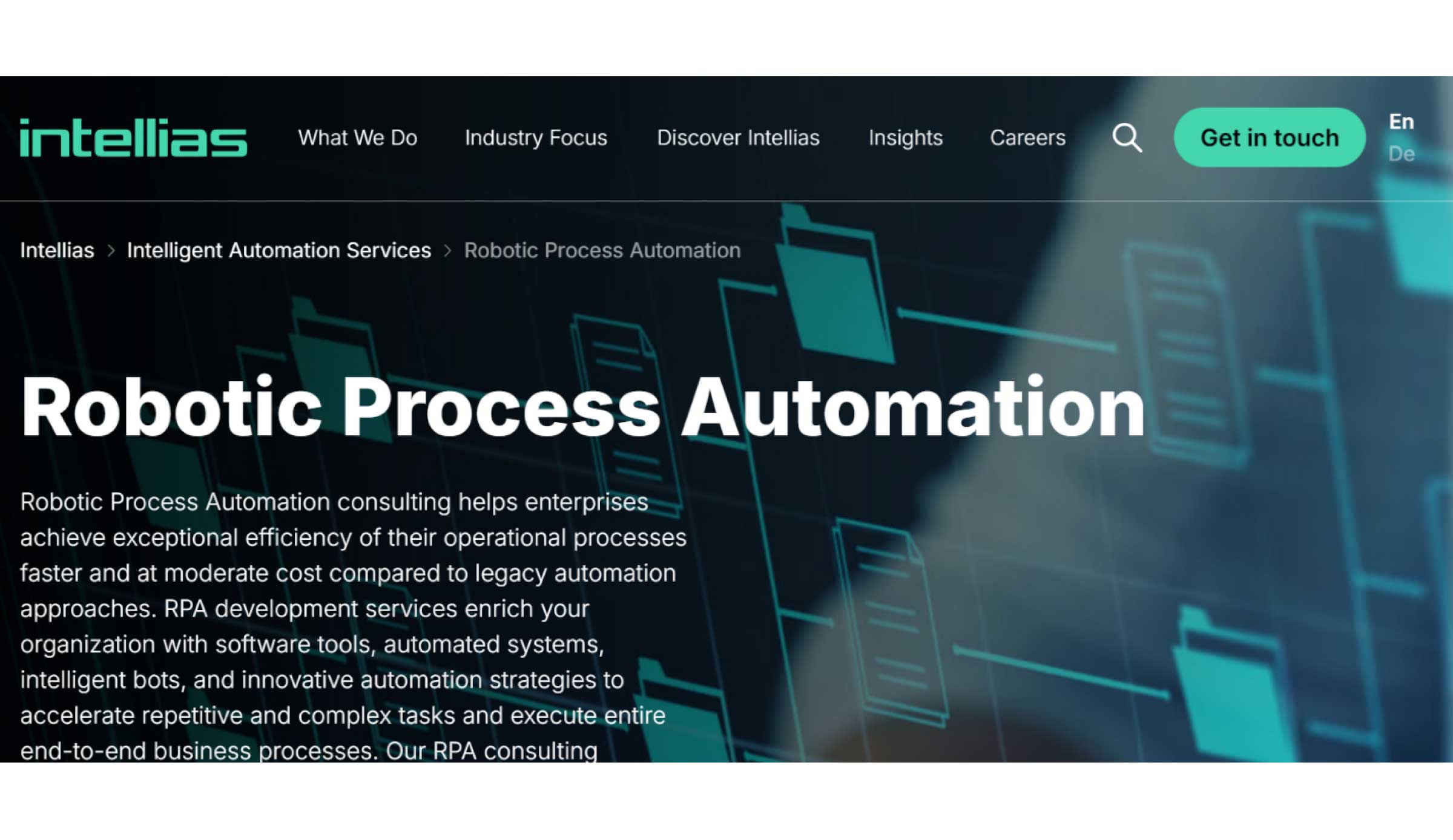
Founded: 2002
Overview: Intellias is a global technology partner that offers a wide range of digital transformation solutions, including Robotic Process Automation (RPA). They focus on providing innovative and scalable RPA solutions, combining their expertise in software engineering with automation technologies. Intellias is known for its ability to build customized automation solutions tailored to clients’ specific needs.
Key Features:
- Custom RPA development and integration
- Strong software engineering and development focus
- Scalable RPA solutions for large enterprises
Pros:
- Customizable RPA solutions
- Strong software development background
- Scalable for enterprise-level automation
Cons:
- May not have as deep a focus on specific industries as niche RPA service companies
Industry Expertise: Automotive, financial services, telecommunications, healthcare, and e-commerce.
Pricing: Custom pricing based on project scope
Revenue: $200 million+
12. Pega (Pegasystems)
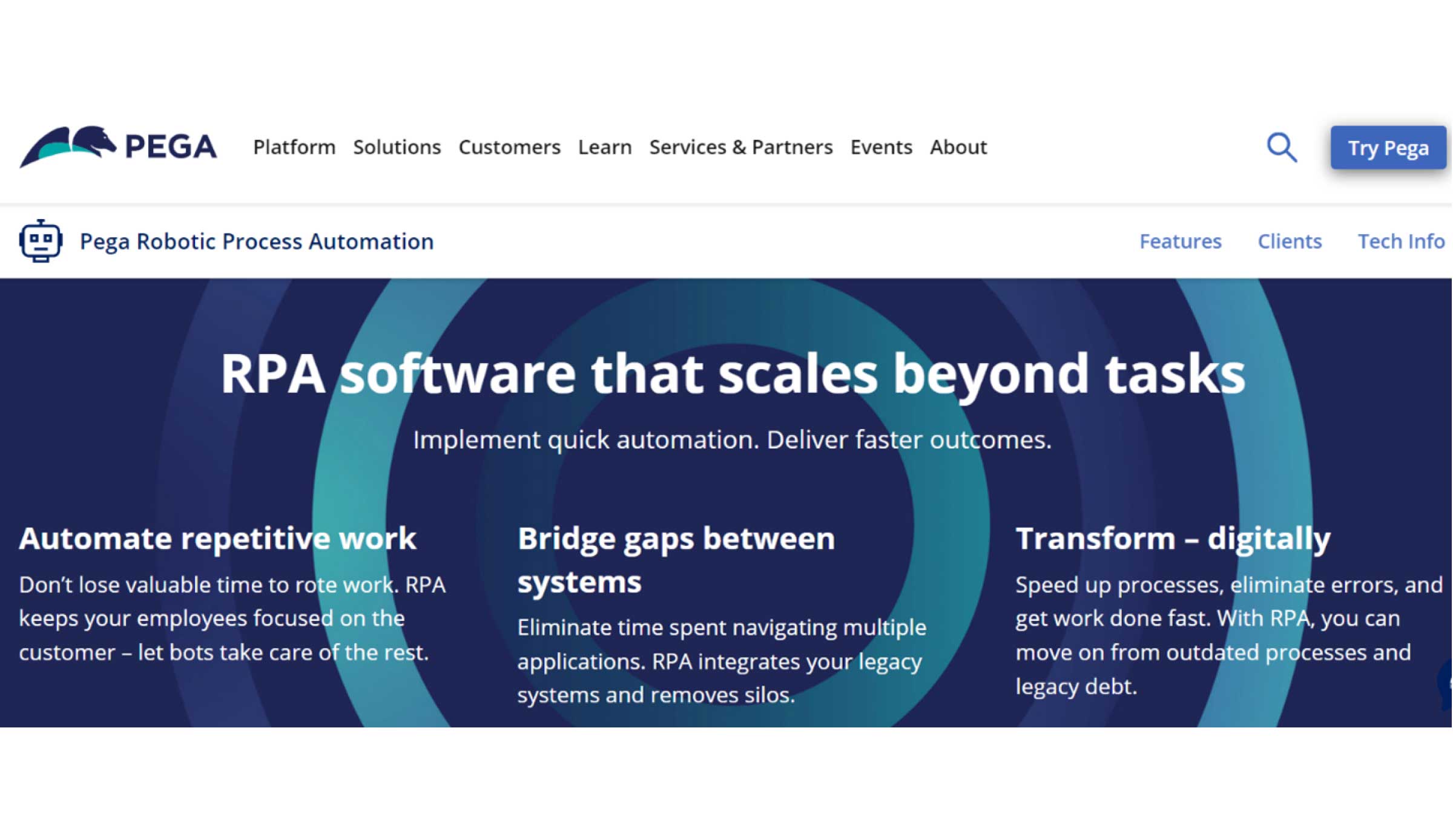
Founded: 1983
Overview: Pegasystems (Pega) is a well-established software company that specializes in business process management (BPM) and customer relationship management (CRM) solutions, alongside its robust Robotic Process Automation (RPA) offerings. Pega provides intelligent process automation solutions that help organizations streamline their workflows, optimize operations, and improve customer experiences. Its platform integrates AI-powered decision-making with automation, making it a top choice for enterprises looking to combine business process management with RPA.
Key Features:
- Unified BPM, CRM, and RPA platform
- AI-powered decision-making and automation
- Scalable, low-code automation platform
Pros:
- Combines BPM, CRM, and RPA in a single platform
- Strong AI and machine learning capabilities for smarter automation
- Low-code platform for faster deployment and customization
Cons:
- Complex platform may require a learning curve for new users
- Higher pricing for enterprise-scale solutions
Industry Expertise: Financial services, insurance, healthcare, telecommunications, government
Pricing: Custom pricing based on enterprise needs
Revenue: $1 billion+
Steps to Choose the Right RPA Vendor for Your Business
Automation has become a pivotal component for businesses seeking efficiency, scalability, and a competitive edge. With a variety of automation vendors and solutions available, selecting the right one is often challenging. However, the secret to success is not only in finding the most advanced tools but also aligning them with your business’s specific needs, culture, and goals. Let’s walk through how to simplify the process of selecting the best automation solution.
1. Understanding Your Business Needs: Start with Why
Before diving into vendor comparisons, it’s crucial to reflect on your business’s unique challenges. Automation can streamline operations, reduce costs, and free up human resources, but the right solution will depend on where your pain points are.
Are you looking to automate repetitive tasks? Improve customer experience? Or enhance backend operations? Perhaps you're in a highly regulated industry like healthcare or finance where compliance is key. Define your goals clearly to ensure that the automation vendor aligns with your vision.
Example: For a finance firm, automating invoice processing might bring immense value, reducing human error and speeding up payment cycles. On the other hand, a retail company might focus on chatbots to improve customer engagement.
2. Evaluate the Human Element: Will Your Team Adapt?
Introducing automation often triggers fears of job loss or role displacement among employees. However, the reality is that automation, when approached thoughtfully, enhances roles rather than eliminates them. It allows employees to focus on more strategic tasks, increasing overall job satisfaction.
As you assess potential vendors, consider how the tool will integrate into your company’s culture. Is the solution intuitive? Will employees require extensive training? Does the vendor offer post-implementation support? These human factors are essential in ensuring smooth adoption and maximizing ROI.
Tip: Look for vendors who offer strong onboarding and continuous support services. Change management is critical; the smoother the transition, the more successful the automation deployment will be.
3. Long-Term Scalability: Think Beyond Immediate Gains
When choosing an automation solution, it’s important to think long-term. While some vendors may offer attractive short-term savings, will the solution grow with your business? Scalability ensures that your business won’t outgrow the tool within a few years.
Consideration: Look for vendors who offer modular tools, where additional features can be added seamlessly as the needs of your business grow. This will save you from having to reinvest in new tools down the line.
4. Customization and Flexibility: Tailoring to Your Specific Workflows
No two businesses operate in the same way, and automation solutions shouldn’t be “one-size-fits-all.” A highly flexible and customizable automation tool will enable your organization to adjust it based on specific workflows, policies, and business practices.
When assessing vendors, ask about customization capabilities. Can the solution be tailored to meet industry-specific regulations? Does it offer easy-to-configure workflows that mirror your current processes?
This will not only ensure that the automation solution fits into your existing setup but also allow for faster integration with minimal disruption.
5. Vendor Credibility and Support: Choosing a Trusted Partner
Beyond the technical aspects, the reputation and reliability of the vendor should be a major consideration. A good automation vendor is a long-term partner, helping you navigate challenges as they arise.
Start by evaluating the vendor’s track record in your industry. Have they successfully worked with businesses of similar size and scope? How is their customer support? Vendors that provide fast, reliable support will be invaluable as you encounter technical challenges during implementation.
Advice: Check reviews, request customer testimonials, and evaluate case studies to ensure you are choosing a credible partner. Don’t be afraid to ask for demos or trials, which can give your team a feel for how well the tool fits.
Looking for an RPA service provider who can help you improve productivity and boost ROI?
Let’s Talk!Latest RPA Market Trends and Insights
The 2025 Gartner Magic Quadrant for RPA emphasizes a competitive field where several vendors continue to stand out as leaders based on their performance and vision for the future of automation. Below are key insights into some of the top leaders:
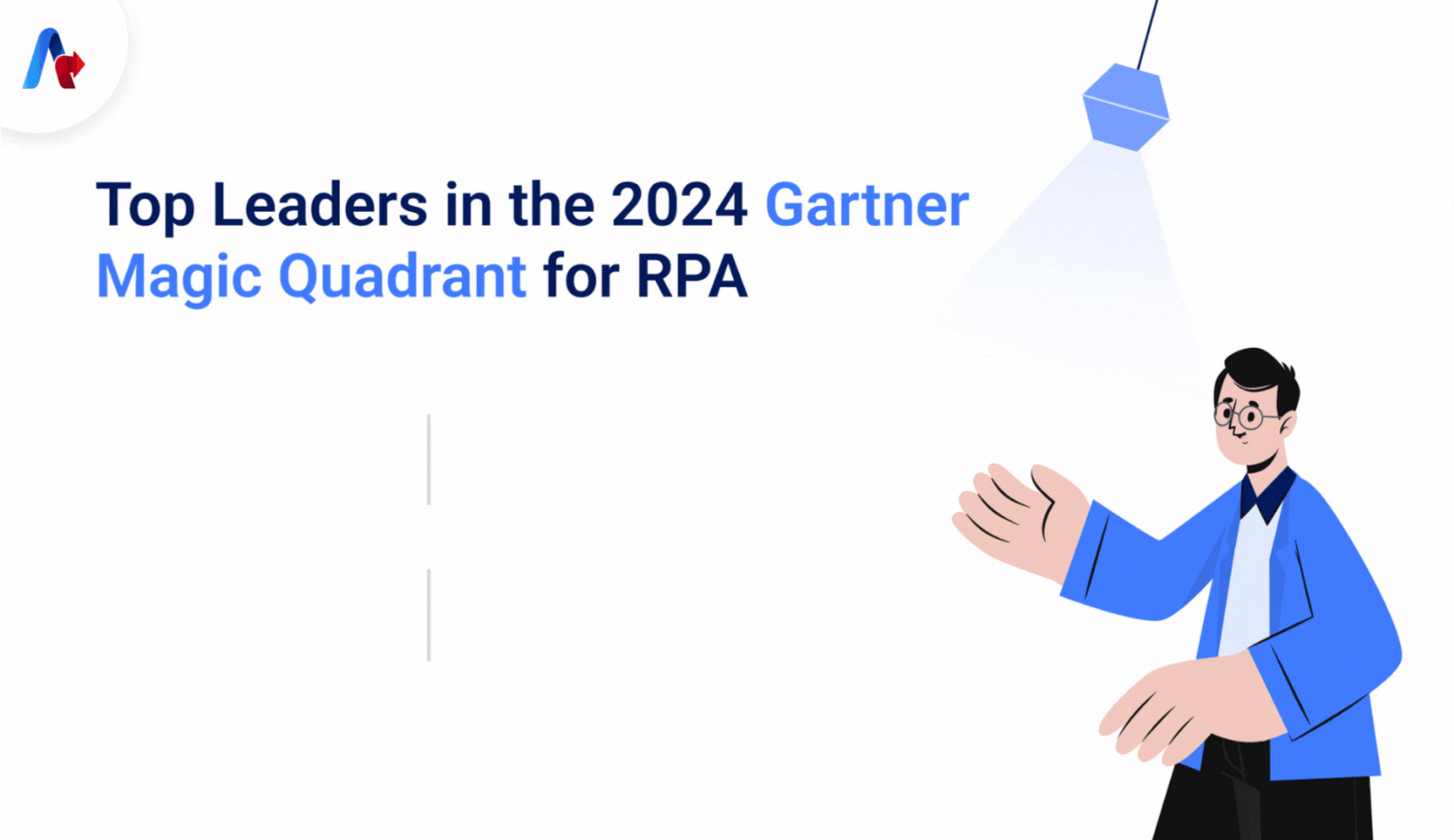
1. UiPath
UiPath remains a consistent leader in the Gartner Magic Quadrant, marking its sixth consecutive year in this position. The company's RPA platform is lauded for its wide range of capabilities, including generative AI, natural language processing (NLP), and intelligent document processing (IDP). One of UiPath’s most notable innovations is its Autopilot feature, which leverages AI to help developers and testers build automations through GenAI prompts. This enables rapid automation development and addresses a wide variety of use cases.
UiPath also focuses heavily on maintaining secure and reliable AI models, like the AI Trust Layer, which ensures customer data privacy. As a trusted UiPath platinum partner,Accelirate works closely with businesses to ensure that their automation services are optimized fully and lead to significant ROI.
2. Automation Anywhere
While not covered in earlier sections,Automation Anywhere is another leader frequently noted for its innovations in cloud-native RPA. The company's Automation 360 platform focuses on combining RPA with AI and machine learning (ML), offering businesses the ability to scale automations across cloud and on-premises environments. The company emphasizes a user-friendly experience, leveraging AI-powered tools like Bot Insights for real-time analytics. Its strong cloud-native approach and flexibility make it a key player in the enterprise automation space.
3. Microsoft
Microsoft has been gaining ground in the RPA space, recognized for its Power Automate platform, which seamlessly integrates with its larger ecosystem, including Microsoft 365 and Azure AI services. Power Automate allows users to automate tasks across apps and services, leveraging low-code/no-code capabilities. The platform’s built-in AI features, such as process mining and task automation, help organizations streamline workflows, reduce manual tasks, and optimize productivity. Microsoft's broad enterprise presence and integration into its cloud infrastructure provide it with a strong foundation to support business automation at scale
4. SS&C Blue Prism
SS&C Blue Prism has also maintained its leadership position for several years, recognized for its robust capabilities in unattended automation and enterprise-grade intelligent automation solutions. Blue Prism focuses on providing strategic, end-to-end automation that supports a wide range of business processes, such as document processing, payroll, and customer onboarding. Its platform allows organizations to automate complex workflows, offering significant scalability and integration with other technologies. Blue Prism is particularly noted for excelling in intelligent automation, ensuring that enterprises can achieve fully digital transformation.
Gartner’s 2025 report highlights the growing trend towards incorporating AI and advanced automation capabilities into traditional RPA solutions. Vendors that can integrate technologies like generative AI, process mining, and API integrations are poised to lead the market. These capabilities are seen as critical for organizations seeking not just cost reductions, but also enhanced productivity and innovation across their operations.
What Is the Future Scope of RPA?
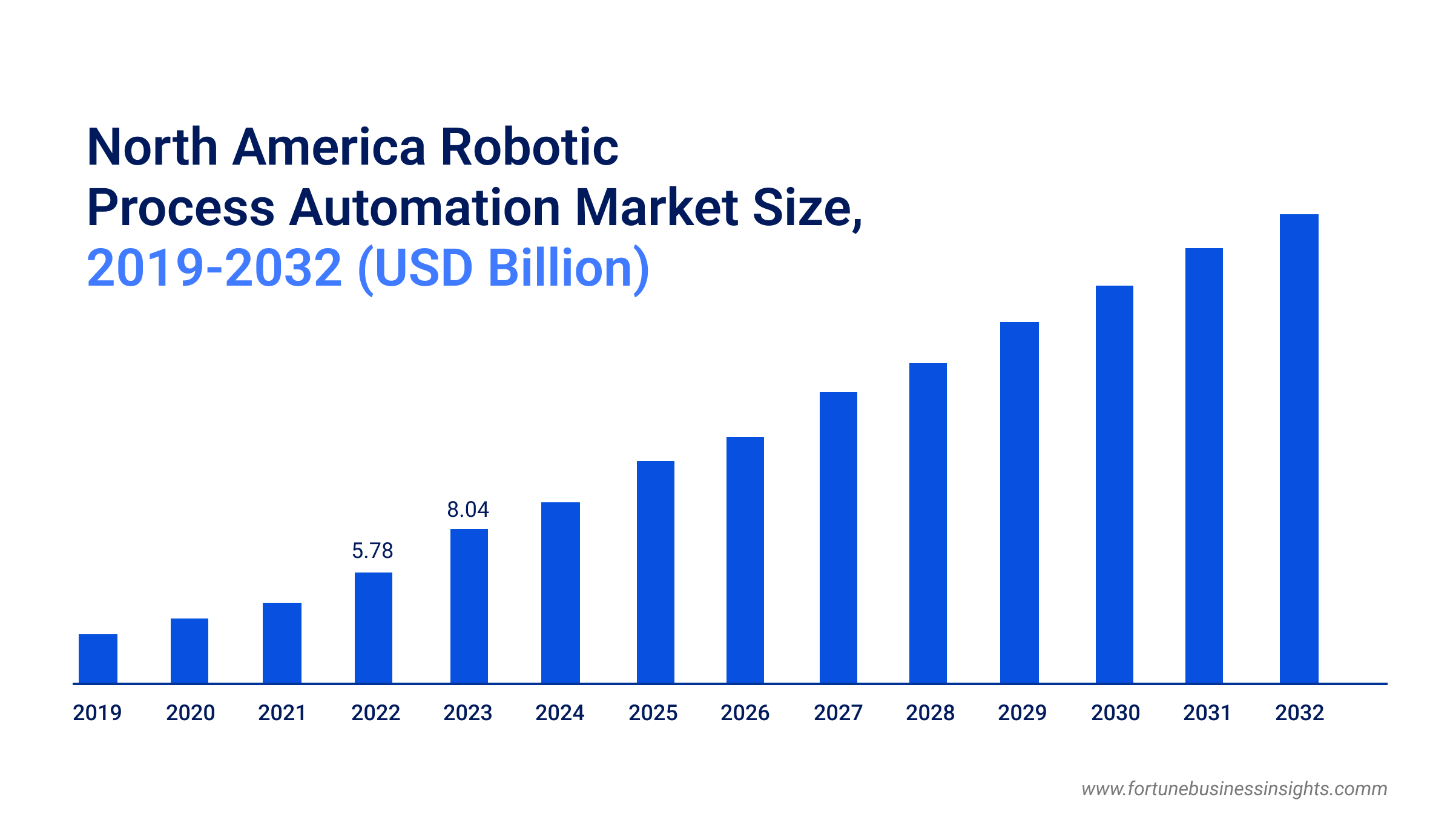
RPA tools have made significant strides, but their reliance on transactional automation often leads to high management overhead. This complexity arises because managing individual automated processes across multiple systems becomes cumbersome, especially as organizations scale. As a result, a new category of enterprise applications known as autonomous applications has emerged to overcome these limitations. So, how has the evolution from RPA to intelligent autonomous applications worked for businesses? Let’s find out!
Autonomous Applications:
- Cognitive capabilities: Autonomous applications utilize machine learning and natural language processing to handle more complex processes, such as decision-making and predictions.
Intelligent automation: These apps go beyond simple task automation by integrating AI and cognitive capabilities, allowing them to make decisions and adapt processes based on real-time data.
AI-driven efficiency: These systems can analyze patterns, optimize workflows, and reduce human intervention, making them more scalable and manageable than traditional RPA systems.
Scale Your Business with the Right RPA Service Provider Today!
In 2025, companies are increasingly looking for service providers that offer not only robust automation but also capabilities in AI, machine learning, and intelligent automation to enhance business efficiency and productivity.
The global Automation market is estimated to reach 31 million dollars by 2030 and as per McKinsey survey around 70% of organisations are already piloting automation technologies.
This clearly indicates how RPA adoption & implementation can significantly benefit businesses in terms of higher efficiency, cost savings, and smooth business operations.
When choosing the right RPA service provider, businesses must consider several factors, such as industry-specific expertise, scalability, ease of integration, and pricing. Whether you are a small business looking to automate simple processes or a large enterprise seeking complex automation solutions, there is an RPA provider suited to your needs.
Ultimately, the right RPA services company can provide the tools needed to automate business processes, reduce costs, and improve overall efficiency. As the demand for robotic process automation service providers grows, the leaders listed in this article stand out in their ability to drive transformation through cutting-edge technology and expertise.
Whether you’re just beginning your RPA journey or looking to expand your existing automation infrastructure, these top RPA service companies in the USA for 2025 are well-equipped to help you stay ahead in the automation race.


